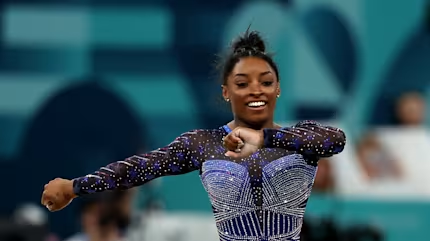
Simone Biles trolls Trump’s harsh panel statements, saying, “I love my black job”.
In a surprising twist of public commentary, Olympic gymnast Simone Biles has stirred the media landscape with her latest remarks. Addressing former President Donald Trump’s recent panel statements, Biles delivered a bold and memorable retort, declaring, “I love my black job.” This statement has not only captured attention but also ignited a flurry of reactions across the political and social spectrum.
Trump’s comments had been criticized for their harshness and perceived insensitivity, particularly regarding issues of race and employment. Biles’ response comes as part of a broader conversation on how public figures engage with issues of race and representation. By referencing her “black job,” Biles seems to be playfully yet pointedly challenging Trump’s narrative and highlighting her pride in her own achievements and identity.
Simone Biles, known for her remarkable gymnastics career and advocacy on mental health, has often used her platform to address various social issues. Her latest statement can be seen as an extension of her ongoing efforts to confront and comment on societal matters. By employing humor and a touch of irony, Biles not only makes a statement but also reinforces her position as a vocal and influential figure in contemporary discourse.

The phrase “I love my black job” is a clever play on words that serves multiple purposes. It asserts Biles’ pride in her heritage and accomplishments while simultaneously poking fun at the criticisms that Trump has levied. This kind of response is characteristic of Biles’ approach, combining personal empowerment with social commentary to make a point.
Reactions to Biles’ comment have been mixed. Supporters praise her for her courage and for using humor to address serious topics. They argue that her statement is a powerful reminder of the importance of embracing one’s identity and achievements, irrespective of external criticisms or societal pressures. Critics, however, might view the comment as divisive or as an unnecessary escalation of an already charged debate.
The broader context of this exchange highlights ongoing tensions in American public discourse. Trump’s statements, which had previously been dismissed as controversial, are now being reframed in light of Biles’ retort. This shift underscores the dynamic nature of political and social dialogue, where public figures’ comments can rapidly evolve into broader conversations about identity and representation.
Biles’ approach also reflects a growing trend among celebrities and athletes who leverage their influence to weigh in on political and social issues. By making her comment, Biles joins a cohort of figures who use their platforms to challenge prevailing narratives and to advocate for social change in creative and impactful ways.
As the story continues to unfold, many are watching to see how this exchange will influence further public discussions. Will Biles’ statement lead to more open conversations about race and identity, or will it be viewed as a contentious episode in a larger debate? The impact of her words may become clearer as the media and public digest and reflect on their significance.
In the meantime, Biles remains a prominent figure in both sports and social commentary. Her ability to engage with complex issues while maintaining her distinct voice highlights her role as not just an athlete but also a cultural commentator. This dual role positions her uniquely to influence discussions on race and representation.
Ultimately, Simone Biles’ comment is a reminder of the power of words and the ways in which public figures can shape discourse. Whether through humor or direct critique, the impact of such statements often extends beyond immediate reactions, contributing to a larger dialogue about societal values and issues.
Leave a Reply